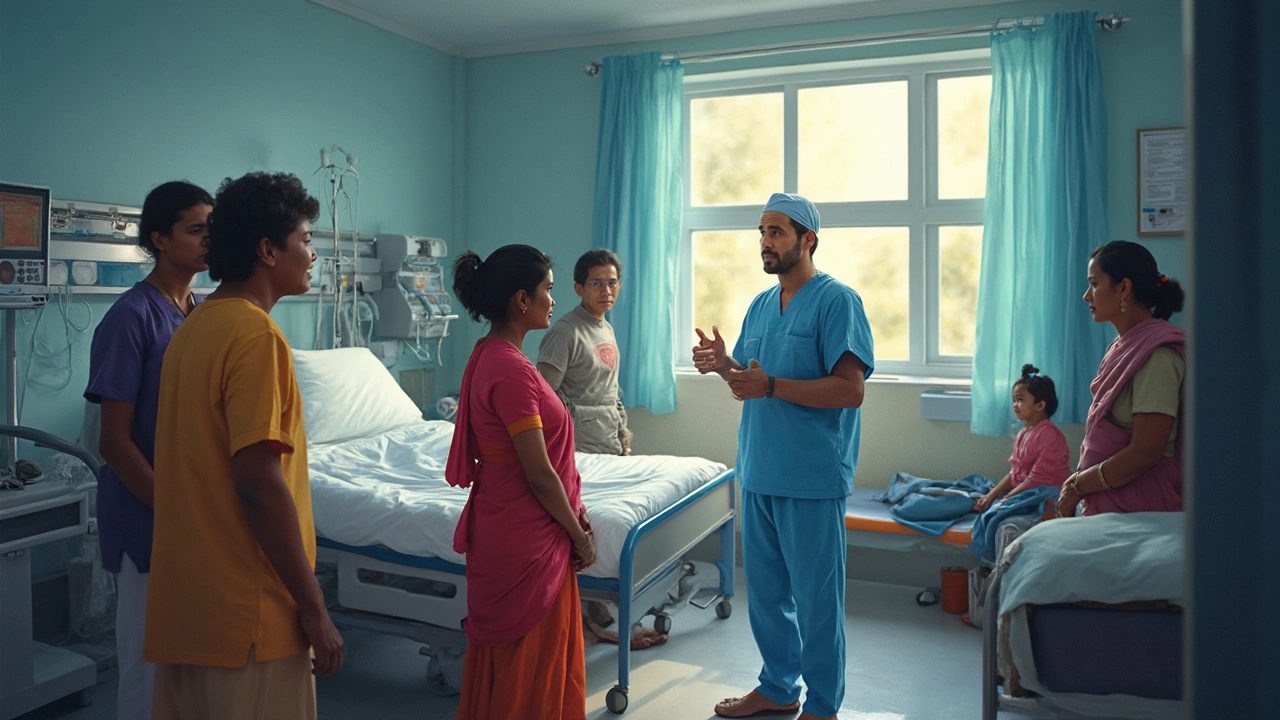
Heart surgery can seem daunting but understanding a bit about the process can ease some anxiety. Different types of heart surgeries have varying timelines. For instance, a coronary artery bypass graft (CABG) might take three to six hours, while valve repairs or replacements could stretch longer depending on complications. Yet, it’s not just about the clock; other factors play a part too.
What are these factors? Well, the patient's underlying health condition is crucial. A healthier heart might mean less time under the knife. And the surgical team's experience counts too. A seasoned team can efficiently handle surprises, shaving off precious minutes. Yet, it’s crucial not to rush – precision is what counts.
Types of Heart Surgeries
When it comes to heart surgery, there are several main types, each with its own purpose and duration. Understanding these can help you sort out what to expect in terms of time and recovery.
Coronary Artery Bypass Graft (CABG)
This is one of the most common heart surgeries. It's like rerouting traffic on a highway. Surgeons take blood vessels from other parts of the body, often the leg, and use them to bypass blocked arteries in the heart. Typically, this type of surgery lasts between three to six hours, but factors like the number of bypasses needed can affect the time.
Heart Valve Repair or Replacement
Valves ensure blood flows in the right direction through the heart. If they're faulty, surgeons might repair or replace them. This procedure could take anywhere from two to four hours, but it can vary based on the techniques used and the patient's specific situation.
Percutaneous Coronary Intervention (PCI)
Also known as angioplasty, this less invasive procedure uses a catheter to open up blocked coronary arteries. While not as time-consuming as open-heart surgeries, it can still take several hours, especially if multiple stents are placed.
Heart Transplant
In really severe cases, a damaged heart might need to be swapped out for a healthy one from a donor. This is complex and can last up to 12 hours. Timing is crucial too, as the donor heart only remains viable outside the body for a limited time.
Here's a quick overview that might help:
| Surgery Type | Typical Duration (Hours) |
|---|---|
| Coronary Artery Bypass Graft (CABG) | 3-6 |
| Heart Valve Repair/Replacement | 2-4 |
| Percutaneous Coronary Intervention (PCI) | 1-2 |
| Heart Transplant | 8-12 |
These big operations might sound scary, but they save lives every day. Knowing what's involved can help you prepare and deal with the stress of surgery.
Factors Affecting Surgery Duration
So, what really determines how long a heart surgery will take? It’s a mix of things. First off, the type of surgery matters. Procedures like open-heart surgery are usually longer compared to minimally invasive methods. But it gets deeper than that.
Patient's Health Condition
The patient’s overall health is a biggie. If someone is young and otherwise healthy, they might breeze through it faster. Meanwhile, those with additional conditions like diabetes or obesity may need more intricate care, extending the surgery duration.
Surgical Team's Expertise
Experience counts. An all-star surgical team well-versed in specific techniques often works more effectively, potentially reducing the time spent in the operating room. They’re like the pit crew in a Formula 1 race, quick and efficient.
Technological and Procedural Advances
Thanks to modern technology, some surgeries that used to take ages are quicker than ever. Robotics, for example, can help with precision and speed. Plus, newer anesthesia techniques mean faster and smoother operations.
Table: Average Surgery Times
| Type of Surgery | Estimated Duration |
|---|---|
| Coronary Artery Bypass Graft (CABG) | 3-6 hours |
| Valve Replacement | 4-5 hours |
| Minimally Invasive Surgery | 2-4 hours |
All in all, there’s no one-size-fits-all answer. But understanding these factors helps in planning and mentally preparing for what’s ahead.

Patient Preparation
Getting ready for heart surgery is a critical step for a successful outcome. It’s not just about mental prep; there are practical steps to consider that can make a big difference on the day of your surgery and during recovery.
Medical Checks
Your doctor will schedule a series of tests beforehand. These usually include blood tests, chest X-rays, and an electrocardiogram (ECG). These checks help in assessing the current state of your heart and overall health.
Medications
If you're on regular medicine, your healthcare provider will advise if you need to make any changes. Some medicines might need to be stopped a few days before surgery, particularly blood thinners which can affect clotting.
Diet and Lifestyle
Doctors often recommend avoiding alcohol and quitting smoking well in advance of the cardiac operation, as these can complicate anesthesia and healing. Maintaining a balanced diet is essential, focusing on light meals the day before the surgery.
What to Bring
Pack a hospital bag with essentials: comfortable clothing, personal items like toothbrush and toothpaste, proper identification, and insurance information. It’s also a good idea to keep contact information for loved ones and your basing physician handy, should there be a need to communicate during your hospital stay.
Emotional Support
Feeling anxious is normal, but leaning on family members or close friends can provide comfort. You might also find it helpful to speak with a counselor about any fears or concerns. Being mentally prepared can significantly impact your recovery process.
Statistics and Insights
| Preparation Step | Typical Timing |
|---|---|
| Medical Tests | 1-2 weeks prior |
| Medication Adjustments | 1 week prior |
| Dietary Changes | 1 month prior |
Proper preparation can influence the duration and success of your surgery and make the experience less stressful overall.
Recovery Time
After you've had heart surgery, recovery is crucial. It's where your real journey begins. Typically, you'll spend about five to seven days in the hospital post-surgery, but this can vary depending on the type and complexity of your surgery.
Once you're home, full recovery could take anywhere from six weeks to three months. It's important not to rush things, even if you feel better. Your body needs time to heal.
First Few Weeks
In those first weeks at home, you might experience some discomfort or tiredness. It's completely normal. Watching for signs of infection, managing pain, and following medication instructions are key. Your doctor will likely suggest a mix of rest and light activity. Walking around your home or garden can be a great start.
Exercise and Diet
Gradually, exercise becomes a friend again. A structured cardiac rehabilitation program is often recommended. It helps you regain strength and ensures you're doing the right amount of physical activity. Nutrition also plays a big part. Eating heart-healthy foods rich in fruits, vegetables, and lean proteins supports recovery.
- Exercise regularly, but don't overdo it.
- Stick to the dietary guidelines your doctor provides.
- Attend all follow-up appointments.
Mental and Emotional Recovery
Don't overlook your mental well-being. Feelings of anxiety or depression can pop up, which is entirely normal. Sharing your feelings with family, friends, or a professional can help ease this transition.
Remember, surgical recovery is as much mental as it is physical. Taking it one day at a time, being patient with yourself, and leaning on available resources make all the difference.





Rohan Talvani
I am a manufacturing expert with over 15 years of experience in streamlining production processes and enhancing operational efficiency. My work often takes me into the technical nitty-gritty of production, but I have a keen interest in writing about medicine in India—an intersection of tradition and modern practices that captivates me. I strive to incorporate innovative approaches in everything I do, whether in my professional role or as an author. My passion for writing about health topics stems from a strong belief in knowledge sharing and its potential to bring about positive changes.
view all postsWrite a comment